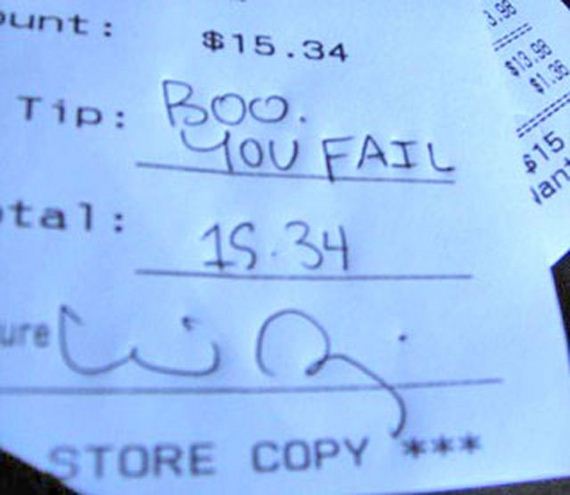When the check comes at the restaurant, the tip is always a bit of a puzzle. For me, at least.
Countless dinners with friends and family have since helped me figure out a simple method of calculation: Take 10 percent of the total, then double that for a reasonable 20 percent tip. But beyond the math, there’s an entire line of reasoning underneath the culture of tipping, and recent articles have ignited a pretty ferocious debate about whether tips should be earned or expected after a meal.
A blog on Wait But Why, “Everything You Don’t Know About Tipping,” outlined three hilariously awkward scenarios about tipping. Then, it broke down in a nifty chart exactly how much customers should be paying in tips for waiters, restaurant deliveries, hotel bellmen and hair salons. There’s even a slightly offensive “tipping spectrum” categorizing the worst to best tippers. In short, the author emphasizes: “Tipping is about making sure you don’t mess up what you’re supposed to do.”
This post clearly struck a nerve. More than 1,000 Facebook comments and 500 in-article comments have appeared at the bottom, many of them going back and forth about who’s right and who’s wrong. They’re pretty interesting to read, as they expose different perspectives about tipping in other cultures, and it becomes pretty obvious who has actually been employed as a server, and who hasn’t. Even real restaurant owners have submitted their two-cents to the discussion.
Disclaimer: I haven’t. As a teen and young adult, I’ve worked my share of jobs, from retail assistant to grocery store cashier to amusement park cashier. I know what it’s like to be on the front lines of customer service, and to experience the rudest sides of humanity. But I’ve never been a waiter.
Until this post, I’ve admittedly been somewhat ignorant about tipping. I didn’t know that many restaurants pay their servers below minimum wage, out of the expectation that their servers will be compensated with a load of tips. So I hardly bothered to pay an actual tip, leaving only a dollar, maybe two, at the most. Like much of America, I believed that waiters had to earn my extra hard-earned money. If they did a mediocre job, they got a mediocre tip. Eating out at a decent restaurant is already horribly expensive, upwards of $15. Add a drink, and you could easily hit $30 or more for so-so food and a so-so glass of wine. Apparently, according to the post, you’re supposed to tip no matter what, even if the service was bad, because it’s literally going into the salary of the waiter.
To provide extra perspective, I found a Slate article, “What Happens When You Abolish Tipping,” that examined what would happen if customers stopped tipping waiters. The gratuity would be already included in the bill, and management would distribute the collective tips a bit more fairly among the waiters and the kitchen staff. In the first post, commenters raged about how the burden was on the restaurant owner to pay their employees well. Others spat back that paying employees more would only increase the cost of labor and make it harder to turn a profit. The Slate article, written by the owner of The Linkery in San Diego, shows evidence that getting rid of tips increased confidence among the staff and actually increased the amount of total tips.
Customer service improved, too. Because waiters no longer had the stress of working solely for tips, they could focus less on the monetary part of their job and more on serving the customer. Psychologically, this makes sense. The customer walks away more satisfied, and the staff takes more pride in service.
Could other restaurants apply the same rule to their staff? I wonder why more owners hesitate to follow the example set by The Linkery. I believe in treating your employees well, which means paying them accordingly. In the meantime, for the sake of waiters everywhere, I’ll be sure to tip better — and be a little nicer.

















